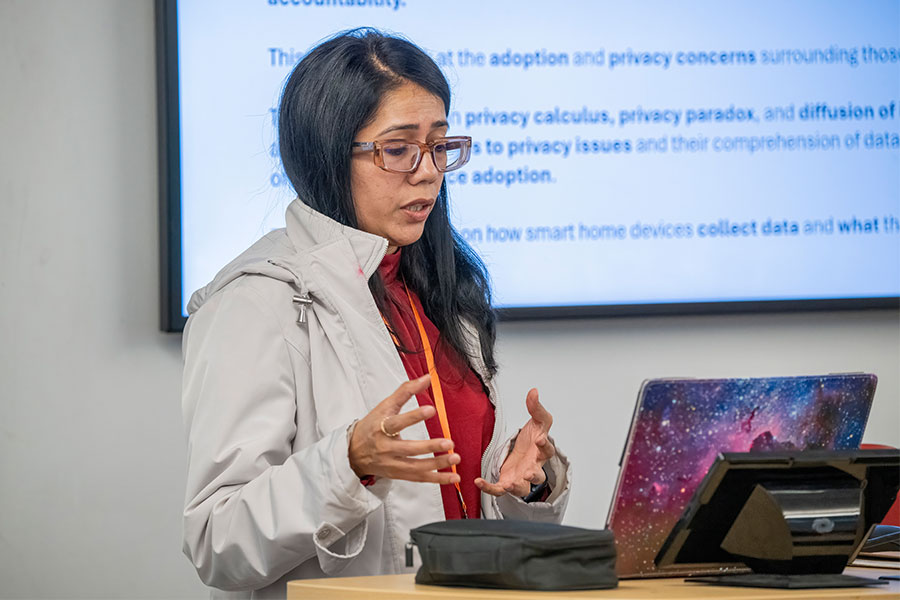Exploring Privacy Concerns in AI-Driven Smart Homes: Spotlight on FSU’s Shezin Waziha Hussain
Shezin Waziha Hussain, a doctoral candidate in FSU’s School of Information, is applying her background in data privacy law to her research on the consumer adoption of AI-driven smart home devices.
Shezin’s interest in AI began when she coauthored a paper for the 2023 America's Conference on Information Systems (AMCIS). In 2024, as a technology intern for the Delegation for Developmental Disability Advocacy, she researched how AI-driven smart home devices influence the independence of individuals with intellectual and developmental disabilities (IDD). Shezin says her interest in exploring AI was “further piqued” as she observed fellow students using AI as part of their studies.
 With the power of smart home devices to enhance independent living skills, Shezin sees the potential for these technologies to improve quality of life for individuals with intellectual and developmental disabilities. Although her current research does not include this particular subset of users, Shezin is focusing on how the AI aspects of smart home devices impact privacy for the consumers using them. She studies not only the biometric features of these devices but also the real-time interactions data and usage levels based on ease and difficulty.
With the power of smart home devices to enhance independent living skills, Shezin sees the potential for these technologies to improve quality of life for individuals with intellectual and developmental disabilities. Although her current research does not include this particular subset of users, Shezin is focusing on how the AI aspects of smart home devices impact privacy for the consumers using them. She studies not only the biometric features of these devices but also the real-time interactions data and usage levels based on ease and difficulty.
In her research, Shezin uses AI technologies such as Research Rabbit, Elicit, and Perplexity to analyze articles used in her literature reviews. She finds these tools useful for simplifying the research process, helping narrow her attention on specific theories and results. When asked what excites her most about AI technologies, Shezin says she finds the “seamless integration of AI in our daily lives … exciting yet concerning.” Shezin believes that an overreliance on AI is one of the more significant challenges presented by AI technologies in the field of information, especially when AI is used for research without fact-checking or cross-verifying its results:
“I have come across peers who use AI frequently and rely heavily on the responses it generates. I feel most people do not want to do the groundwork of researching by themselves but task it upon AI tools to generate responses. AI tools may make the tasks easier by pulling all the information from the web, but the authenticity of the information needs to be cross verified.”
 While optimistic about AI’s ability to assist with research, Shezin cautions against “blindfolded usage of AI tools.” Since the “question of quality [and] authenticity will always be lurking” when using generative AI, Shezin stresses the need for AI training and awareness programs.
While optimistic about AI’s ability to assist with research, Shezin cautions against “blindfolded usage of AI tools.” Since the “question of quality [and] authenticity will always be lurking” when using generative AI, Shezin stresses the need for AI training and awareness programs.
Shezin is hopeful the research she is doing now will help highlight a consumer perspective on AI-driven smart home devices and data privacy. In the future, she plans to continue her research by exploring the way the AI features of these household devices impact individuals with intellectual and developmental disabilities.

